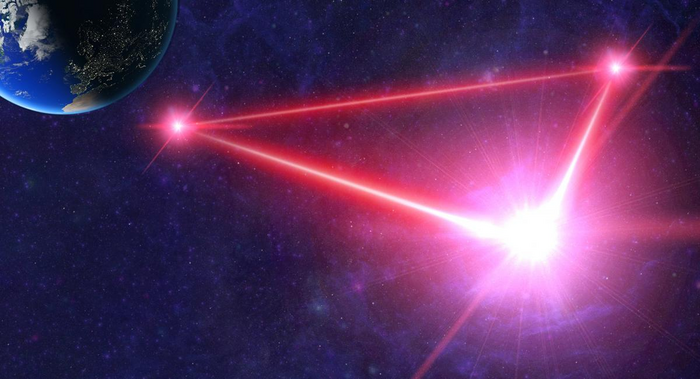
Image Credit: Scuola Internazionale Superiore di Studi Avanzati
Since 2015, the huge ground-based LIGO, Virgo, and KAGRA interferometers have made it possible to detect such signals, although just about a hundred such events, an infinitesimal fraction of the total, have been noted.
The majority of the waves stay “indistinguishable”, superimposed, and added collectively, thereby making a flat, diffuse background signal that researchers refer to as the “stochastic gravitational wave background” (SGWB).
A new study performed by SISSA (Scuola Internazionale Superiore di Studi Avanzati) suggests making use of a constellation of three or four space interferometers to map the flat and nearly homogeneous background in a quest for ripples.
The study has been reported in The Astrophysical Journal.
Such small fluctuations, familiar to researchers as anisotropies, hold the data required to understand the dispersion of gravitational wave sources on the biggest cosmological scale.
Scientists are confident that next-generation detectors like the Laser Interferometer Space Antenna (LISA) and Einstein Telescope will make a direct measurement of the gravitational wave background feasible in the predictable future.
Measuring these background fluctuations, known more correctly as anisotropies, will however continue to be extremely difficult, as identifying them requires a very high level of angular resolution not possessed by current and next generation survey instruments.
Giulia Capurri, Study First Author and Ph.D. Student, Scuola Internazionale Superiore di Studi Avanzati
Capurri, monitored by Carlo Baccigalupi and Andrea Lapi, has indicated that this issue could be beaten through a “constellation” of three or four space interferometers in solar orbit spanning a distance nearly that of between Earth and the Sun. Since the separation is high, interferometers achieve improved angular resolution, thereby enhancing their potential to differentiate sources of gravitational waves.
A constellation of space interferometers orbiting the Sun could enable us to see subtle fluctuations in the gravitational background signal, thus allowing us to extract valuable information about the distribution of black holes, neutron stars, and all other sources of gravitational waves in the universe
Giulia Capurri, Study First Author and PhD Student, Scuola Internazionale Superiore di Studi Avanzati
After the success of the LISA project’s space mission test, there are presently two proposals for the making of space-based interferometer constellations: one European - the Big Bang Observatory (BBO), and one Japanese - the Deci-hertz Interferometer Gravitational-wave Observatory (DECIGO).
This represents one of the earliest work to provide specific predictions of the size of the stochastic background of gravitational waves by a constellation of instruments orbiting the Sun.
Carlo Baccigalupi, Professor of Theoretical Cosmology, Scuola Internazionale Superiore di Studi Avanzati
Baccigalupi added, “Together with further similar projects whose details will be published in due course, they will be crucial for developing an optimal design for future observational instruments that we hope will be built and commissioned in the coming decades.”
In the age of multimessenger astronomy, which started with ground-based interferometers such as Virgo and LIGO, the gravitational-wave background could set the stage for new knowledge of the universe on a large scale.
Journal Reference
Capurri, G., et al. (2023) Searching for Anisotropic Stochastic Gravitational-wave Backgrounds with Constellations of Space-based Interferometers. The Astrophysical Journal. doi.org/10.3847/1538-4357/acaaa3.